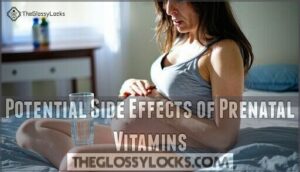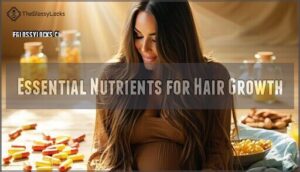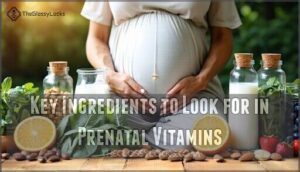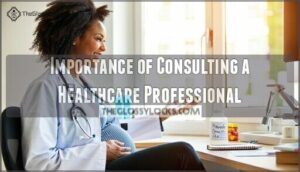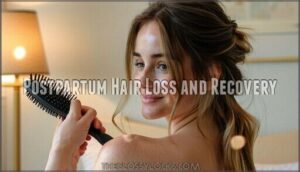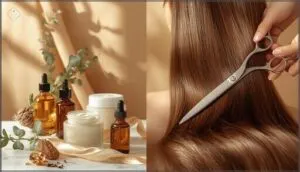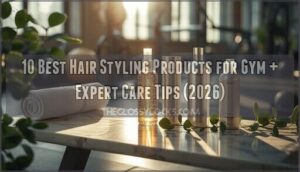This site is supported by our readers. We may earn a commission, at no cost to you, if you purchase through links.
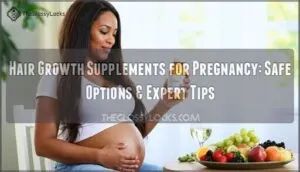
These vitamins pack biotin, folic acid, iron, and vitamin D that support healthy hair growth throughout pregnancy.
Adding extra supplements can actually be risky for you and your baby, so stick with your doctor’s recommended prenatal vitamin.
The hormonal changes during pregnancy often make hair appear thicker naturally, but proper nutrition from your prenatal vitamins gives your hair the best foundation for staying strong and healthy.
Smart nutrition choices and staying hydrated work better than any fancy supplement promises.
Table Of Contents
- Key Takeaways
- Hair Growth During Pregnancy
- Safe Hair Supplements for Pregnancy
- Choosing Right Prenatal Vitamins
- Postpartum Hair Loss and Recovery
- Maintaining Healthy Hair
- Frequently Asked Questions (FAQs)
- What can I take for hair growth while pregnant?
- How can I grow my hair during pregnancy?
- What vitamins are good for your hair while pregnant?
- Can I take prenatals to help with hair growth?
- What vitamins are good for hair growth during pregnancy?
- How can I make my hair grow faster during pregnancy?
- Which prenatal vitamins are best for hair growth?
- Are Prenatals or biotin better for hair growth?
- Can prenatal vitamins cause unwanted hair growth?
- How does pregnancy affect hair texture changes?
- Conclusion
Key Takeaways
- You don’t need extra hair growth supplements during pregnancy since your prenatal vitamins already contain biotin, folic acid, iron, and vitamin D that support healthy hair growth.
- Adding additional supplements can be risky for you and your baby, so you should stick with your doctor’s recommended prenatal vitamin instead of taking extra products.
- Your pregnancy hormones naturally make your hair appear thicker and grow faster, while proper nutrition from prenatal vitamins gives your hair the best foundation for staying strong.
- Smart nutrition choices and staying hydrated work better than fancy supplement promises, so you’ll get the best results by focusing on a healthy diet and your prescribed prenatal vitamins.
Hair Growth During Pregnancy
Your body needs extra nutrients during pregnancy to support both you and your growing baby, including your hair.
Your growing baby isn’t the only one thriving during pregnancy—your hair needs extra love too.
Good nutrition helps keep your hair healthy while prenatal vitamins provide key nutrients like biotin and folic acid that support hair growth.
Importance of Nutrition for Hair Growth
Nutrition serves as your hair’s foundation during pregnancy, influencing everything from strand strength to growth rate.
Your body’s dietary impact becomes vital as it supports both you and your developing baby.
Essential nutrients for healthy pregnancy hair growth include:
- Protein sources – eggs, lean meats, and legumes build hair structure
- Iron-rich foods – prevent vitamin deficiencies that cause hair thinning
- Omega-3 fatty acids – support scalp health and mineral absorption
- Zinc and biotin – enhance hair follicle function
- Adequate hydration effects – maintain ideal nutrient delivery to hair roots
Including biotin for keratin production can also contribute to hair health.
Role of Prenatal Vitamins in Hair Growth
Most prenatal vitamins support pregnancy hair growth by improving vitamin absorption and delivering essential nutrients to hair follicles.
These supplements address dosage concerns while promoting scalp health, though genetic predisposition still influences results.
Best prenatal vitamins hair formulas contain iron and vitamins that boost hair growth pregnancy outcomes.
Remember, prenatal hair vitamins work best when combined with proper pregnancy hair health habits, including a focus on hair growth.
Benefits of Biotin and Folic Acid for Hair Health
When you’re expecting, your body kicks into overdrive producing new cells, including hair cells.
Your pregnancy transforms your body into a powerful cell-production factory, working around the clock to build new life.
Biotin hair growth support works hand-in-hand with folic acid benefits to fuel hair cell production during pregnancy.
These prenatal hair vitamins enhance nutrient absorption and support scalp health.
Most pregnancy hair health experts confirm biotin pregnancy safe levels help maintain strong strands while folic acid promotes hair growth pregnancy success through improved circulation and cellular renewal.
Safe Hair Supplements for Pregnancy
When you’re expecting, you want hair supplements that support both you and your baby’s health safely.
Prenatal vitamins offer the best option since they’re specifically formulated for pregnancy and contain nutrients that naturally promote hair growth.
Ingredients to Look for in Prenatal Vitamins
When choosing pregnancy supplements, focus on specific nutrients that support both your health and hair growth.
Look for prenatal vitamins containing these key ingredients:
- Folic Acid – prevents birth defects and supports healthy cell division
- Iron Intake – combats anemia while promoting circulation to hair follicles
- Vitamin D – enhances nutrient absorption and follicle health
- Omega-3s – reduce inflammation and nourish scalp
Quality prenatal hair growth vitamins should also include Zinc Benefits for protein synthesis and adequate Protein Sources for strong hair structure.
Supplements can be found for folic acid intake.
Potential Side Effects of Prenatal Vitamins
While safe hair supplements offer benefits, you’ll want to watch for common side effects.
Nausea affects up to 70% of users, mainly from iron content in pregnancy supplements. Constipation troubles 50% of women taking prenatal vitamins.
You might experience digestive issues like diarrhea or decreased appetite. Allergic reactions can cause skin rashes or itching, though severe reactions remain rare.
Prenatal multivitamins are important because deficiencies in key nutrients can cause serious health issues for both mother and child.
Interactions With Medications and Other Supplements
Medication conflicts create serious risks when combining hair supplements with prenatal vitamins. Your healthcare provider should review all supplements before starting any regimen.
One should also be aware of potential birth defects from certain supplements.
- Supplement Interactions: Iron and calcium compete for absorption, reducing effectiveness of both nutrients
- Timing Considerations: Space levothyroxine and iron-containing hair supplements four hours apart for proper absorption
- Dosage Adjustments: Multiple vitamins containing biotin or vitamin A increase toxicity risk requiring professional monitoring
Choosing Right Prenatal Vitamins
When you’re choosing prenatal vitamins for healthy hair growth, you need to focus on specific nutrients that support both your baby’s development and your hair’s strength.
Look for formulations that include iron, biotin, folic acid, and vitamin D – these work together to promote healthy hair while keeping you and your baby safe.
Essential Nutrients for Hair Growth
Your body needs specific nutrients to build strong, healthy hair during pregnancy.
Vitamin D supports follicle health, while iron sources like lean meat prevent hair thinning.
Protein intake fuels growth, and zinc benefits include stronger strands.
Omega-3s nourish your scalp.
Hair growth supplements for pregnancy should contain these hair vitamins and minerals for ideal hair nutrition throughout your hair growth during pregnancy journey, with key elements like Vitamin D.
Key Ingredients to Look for in Prenatal Vitamins
When selecting hair growth supplements for pregnancy, focus on prenatal vitamins with proven ingredients. Look for formulas containing biotin and folic acid, which support healthy hair follicles and prevent breakage.
Key ingredients to prioritize:
- Iron intake and Vitamin D for follicle health and reduced shedding
- Omega-3s and zinc benefits for scalp nourishment and strength
- Protein sources and B-vitamins for keratin production
Choose pregnancy safe shampoo alongside hair vitamins designed specifically for expectant mothers. These hair growth supplements for pregnancy work together to support hair growth during pregnancy while maintaining hair supplements safety. It’s important to find safe prenatal options during pregnancy.
Importance of Consulting a Healthcare Professional
Consulting your doctor before starting vitamins for hair growth guarantees supplement safety suited to your needs.
Healthcare professionals provide personalized advice, address dosage concerns, and identify underlying conditions that affect hair health during pregnancy.
It’s important to remember that excessive B12 intake can also impact hair health.
| What to Discuss | Why It Matters |
|---|---|
| Current medications | Prevents harmful interactions with prenatal vitamins |
| Medical history | Identifies conditions affecting nutrient absorption |
| Dosage recommendations | Ensures safe levels for you and baby |
| Postpartum hair supplements | Plans for continued hair health after delivery |
Your doctor’s expertise helps you choose pregnancy safe shampoo and appropriate hair supplements safety guidelines for the best results.
Postpartum Hair Loss and Recovery
You’ll likely notice significant hair loss within three to six months after giving birth as your hormone levels return to normal.
This temporary condition, called telogen effluvium, affects up to 90% of new mothers and typically resolves on its own within a year, which is a temporary condition.
Causes of Postpartum Hair Loss
After birth, your body undergoes major changes that can trigger hair loss.
Understanding what’s happening helps you prepare for this natural process.
Four main factors cause postpartum hair loss:
- Hormonal Shifts – Estrogen levels drop dramatically after delivery
- Iron Deficiency – Blood loss during childbirth depletes iron stores
- Thyroid Issues – Postpartum thyroiditis affects hair growth cycles
- Stress Impact – Sleep deprivation and new parent stress accelerate shedding
It’s also worth noting that zinc deficiency interrupts the hair growth cycle.
Nutritional Deficiencies and Hair Loss
Your body faces unique challenges after childbirth, and poor nutrition can worsen hair loss after pregnancy.
Iron deficiency tops the list of culprits behind thinning locks, while inadequate protein intake leaves your scalp struggling to rebuild.
| Nutrient | Impact on Hair Loss | Common Signs |
|---|---|---|
| Iron Deficiency | Reduces oxygen to hair follicles | Fatigue, pale skin, brittle nails |
| Vitamin D | Affects new hair growth cycles | Muscle weakness, bone pain |
| Zinc Deficiency | Impairs protein synthesis for hair | Slow wound healing, taste changes |
These nutritional gaps directly affect scalp health and your body’s ability to produce strong hair growth products naturally.
Role of Supplements in Postpartum Hair Recovery
Supplements can jumpstart your hair’s comeback after childbirth.
Clinical studies show targeted postpartum formulas like Nutrafol reduce shedding by 91% within two months.
These pregnancy safe hair products work best with proper supplement timing and dosage considerations.
Many women find success with specialized hair products.
You’ll need three to six months of consistent use for ideal maternal hair health and visible regrowth results.
Maintaining Healthy Hair
Beyond supplements, you’ll want to focus on lifestyle changes that naturally support healthy hair growth during pregnancy.
Simple adjustments to your diet, exercise routine, and stress management can make a real difference in how your hair looks and feels.
Dietary Changes for Healthy Hair
Three simple swaps can transform your pregnancy hair care routine.
Boost protein intake with eggs, lean meats, and beans for stronger strands. Add iron sources like spinach and lentils to support healthy circulation.
Include vitamin rich foods such as berries and sweet potatoes. Don’t forget healthy fats from avocados and nuts—your maternal hair health depends on these essential nutrients working together.
For additional support, consider improving your scalp blood circulation through regular massage.
Importance of Hydration and Exercise for Hair Growth
During pregnancy, staying well-hydrated and exercising regularly creates the perfect foundation for healthy hair growth.
Your scalp circulation improves with both water intake and physical activity, delivering essential nutrients directly to hair follicles.
- Water intake keeps your scalp moisturized and supports nutrient transport
- Exercise benefits include increased blood flow to promote stronger hair
- Sweat impact helps clear pores while boosting scalp circulation naturally
Reducing Stress for Healthy Hair During Pregnancy
Stress-busting strategies can make all the difference for your hair’s health during pregnancy.
When you’re overwhelmed, your body diverts nutrients away from hair follicles.
Practicing Relaxation Techniques like prenatal yoga and mindful practices helps improve Sleep Quality, supporting hair thickening pregnancy naturally.
| Stress Reduction Method | Hair Health Benefit |
|---|---|
| Prenatal Yoga | Boosts circulation to scalp |
| Deep breathing exercises | Reduces cortisol levels |
| Adequate sleep (7-9 hours) | Promotes hair growth after birth |
| Gentle walks outdoors | Prevents hair loss during pregnancy |
Frequently Asked Questions (FAQs)
What can I take for hair growth while pregnant?
Growing hair during this delicate time requires gentler strategies.
Small amounts of hair dye may be absorbed by the skin, leaving little that would be able to reach the fetus, but you’ll want safer alternatives like prenatal vitamins and proper nutrition instead.
How can I grow my hair during pregnancy?
Your hair naturally grows faster during pregnancy thanks to hormonal changes. Focus on prenatal vitamins, gentle scalp massage, protective hairstyles, and avoiding heat styling to maximize healthy growth.
What vitamins are good for your hair while pregnant?
During pregnancy, you’ll find that prenatal vitamins containing biotin, folate, and iron support healthy hair growth.
These nutrients help strengthen hair follicles while meeting your body’s increased demands for essential vitamins and minerals, which is supported by prenatal vitamins.
Can I take prenatals to help with hair growth?
Two heads are better than one" in the context of pregnancy nutrition.
Yes, you can take prenatal vitamins to support hair health during pregnancy.
They’re packed with biotin, folic acid, and iron that nourish both you and baby while promoting stronger hair growth safely.
What vitamins are good for hair growth during pregnancy?
Prenatal vitamins typically contain key nutrients that support healthy hair growth during pregnancy. Look for vitamins with biotin, iron, folic acid, and vitamin D, which help nourish hair follicles naturally.
How can I make my hair grow faster during pregnancy?
You can’t rush Mother Nature, but smart choices help.
Focus on prenatal vitamins with iron, biotin, and folate.
Eat protein-rich foods, stay hydrated, and avoid over-the-counter hair growth supplements that aren’t pregnancy-safe.
Which prenatal vitamins are best for hair growth?
Most prenatal vitamins containing folic acid, iron, and biotin support healthy hair growth during pregnancy. Look for brands with omega-3s and vitamin D for added benefits.
Are Prenatals or biotin better for hair growth?
Between biotin and prenatal vitamins, you’ll find prenatals pack more pregnancy-safe punch for hair health.
They contain biotin plus essential nutrients like folate and iron that support overall hair growth during pregnancy safely.
Can prenatal vitamins cause unwanted hair growth?
You’re wondering about potential side effects from those prenatal vitamins.
Prenatal vitamins typically don’t cause unwanted hair growth, but they can make your existing hair thicker and grow faster due to increased nutrients.
How does pregnancy affect hair texture changes?
Pregnancy hormones dramatically transform your hair’s texture, often making it thicker, shinier, and less prone to falling out.
You’ll likely notice changes in curl pattern, oiliness, and manageability as estrogen levels soar throughout your nine months, which can make your hair thicker.
Conclusion
Amazingly, your prenatal vitamins are already the ultimate hair growth supplements for pregnancy you’ll ever need.
You don’t need additional hair growth supplements for pregnancy when your doctor-recommended prenatal contains biotin, folic acid, iron, and vitamin D.
These nutrients support healthy hair naturally while keeping you and your baby safe.
Extra supplements can cause harmful interactions or overdoses.
Trust your prenatal vitamins, eat well, stay hydrated, and let pregnancy hormones work their magic on your hair.
- https://www.happiestbaby.com/blogs/pregnancy/pregnancy-safe-hair-care
- https://utswmed.org/medblog/biotin-risks-postpartum-hair-loss/
- https://pmc.ncbi.nlm.nih.gov/articles/PMC2567273/
- https://better-notyounger.com/blogs/the-better-blog/can-i-take-hair-skin-and-nail-vitamins-while-pregnant
- https://hairtamin.com/products/hairtamin-mom-1-month-supply



